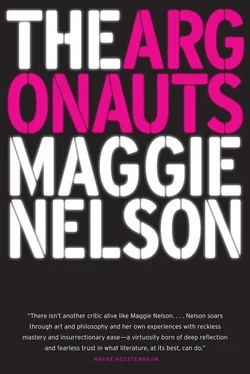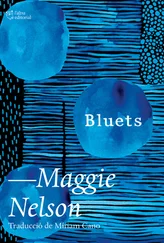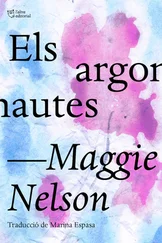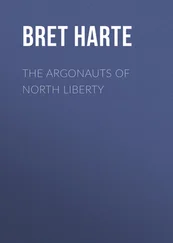It’s so dark, this underspace, dark and sweaty. His thin hair is damp, smells like candy and earth, I burrow my mouth into it and breathe. I don’t ever want to make the mistake of needing him as much as or more than he needs me. But there’s no denying that sometimes, when we sleep together in the dark cavern of the bottom bunk, his big brother thrashing around on top, the white noise machine grinding out its fake rain, the green digital clock announcing every hour, Iggy’s small body holds mine.
One of the most lovable aspects of Winnicott’s writing on children (and on those who attempt to hold them) is his deployment of an “ordinary language” seemingly incapable of histrionics even as it discusses issues of maximum complexity and gravity. In his book Queer Optimism , Michael Snediker offers Winnicott’s “nonironic denomination of adolescent depression as ‘doldrums’” as an example of Winnicott’s signature deflation-without-dismissal. “Easy enough … to wax lyrical on melancholy,” Snediker writes, in reference to queer theory’s long-standing preoccupation with melancholia. “Less easy to wax lyrical about ‘doldrums.’”
One problem with lyrical waxing, as Snediker has it, is that it often signals (or occasions) an infatuation with overarching concepts or figures that can run roughshod over the specificities of the situation at hand. (Winnicott once accused Freud, for example, of using the concept of the death drive to “achieve a theoretical simplification that might be compared to the gradual elimination of detail in the technique of a sculptor like Michelangelo.”)
Such accusations would not come as a surprise to many writers, especially to those who have attempted to pay homage, in their writing, to a beloved. Wayne Koestenbaum tells an instructive story on this account: “Some psycho girlfriend of mine (decades ago!) answered a long rhapsodic letter I’d written her with this terse, humiliating rebuff: ‘Next time, write to me.’ That one command, on a tiny slip of paper, tucked into an envelope. I remember thinking, ‘Wasn’t I writing to her? How could I know, when writing to her, that I secretly wasn’t writing to her?’ At that point, Derrida hadn’t yet written The Post Card , so I didn’t know what to do with my befuddled, wounded sense of being a rhapsodic narcissist of a letter-writer weirdly instructed to ‘relate,’ to speak to someone instead of to the nothingness at the end of writing.”
The inexpressible may be contained (inexpressibly!) in the expressed, but the older I get, the more fearful I become of this nothingness, this waxing lyrical about those I love the most (Cordelia).
I finish a first draft of this book and give it to Harry. He doesn’t have to tell me that he’s read it: when I come home from work, I can see the pile of ruffled pages sticking out of his knapsack, and I can feel his mood, which one might describe as quiet ire. We agree to go out for lunch the next day to talk about it. At lunch he tells me he feels unbeheld — unheld, even. I know this is a terrible feeling. We go through the draft page by page, mechanical pencils in hand, with him suggesting ways I might facet my representation of him, of us. I try to listen, try to focus on his generosity in letting me write about him at all. He is, after all, a very private person, who has told me more than once that being with me is like an epileptic with a pacemaker being married to a strobe light artist. But nothing can substantively quell my inner defense attorney. How can a book be both a free expression and a negotiation? Is it not idle to fault a net for having holes?
That’s just an excuse for a crappy net , he might say. But it’s my book, mine! Yes, but the details of my life, of our life together, don’t belong to you alone. OK, but no mind can take the same interest in his neighbor’s me as in his own. The neighbor’s me falls together with all the rest of the things in one foreign mass, against which his own me stands out in startling relief . A writer’s narcissism. But that’s William James’s description of subjectivity itself, not narcissism . Whatever — why can’t you just write something that will bear adequate witness to me, to us, to our happiness? Because I do not yet understand the relationship between writing and happiness, or writing and holding .
We used to talk about writing a book together; it was to be titled Proximity . Its ethos would derive from Dialogues II , co-authored by Gilles Deleuze and Claire Parnet: “As we became less sure what came from one, what came from the other, or even from someone else, we would become clearer about ‘What is it to write?’”
Eventually, however, I realized that just the idea of such a merging was causing me too much anxiety. I guess I wasn’t ready to lose sight of my own me yet, as for so long, writing has been the only place I have felt it plausible to find it (whatever “it” is).
Shame-spot: being someone who spoke freely, copiously, and passionately in high school, then arriving in college and realizing I was in danger of becoming one of those people who makes everyone else roll their eyes: there she goes again . It took some time and trouble, but eventually I learned to stop talking, to be (impersonate, really) an observer. This impersonation led me to write an enormous amount in the margins of my notebooks— marginalia I would later mine to make poems.
Forcing myself to shut up, pouring language onto paper instead: this became a habit. But now I’ve returned to copious speaking as well, in the form of teaching.
Sometimes, when I’m teaching, when I interject a comment without anyone calling on me, without caring that I just spoke a moment before, or when I interrupt someone to redirect the conversation away from an eddy I personally find fruitless, I feel high on the knowledge that I can talk as much as I want to, as quickly as I want to, in any direction that I want to, without anyone overtly rolling her eyes at me or suggesting I go to speech therapy. I’m not saying this is good pedagogy. I am saying that its pleasures are deep.
It’s like she’s pulling Post-it notes out of her hair and lecturing from them , one of my peers once complained about the teaching style of my beloved teacher Mary Ann Caws. I had to agree, this was an apt description of Caws’s style (and hair). But not only did I love this style, I also loved it that no one could tell Caws to teach otherwise. You could abide her or drop her class: the choice was yours. Ditto Eileen Myles, who tells a great story about a student at UC San Diego once complaining that her lecturing style was like “throwing a pizza at us.” My feeling is, you should be so lucky to get a pizza in the face from Eileen Myles, or a Post-it note plucked from the nest of Mary Ann Caws’s hair.
Cordelia could not heave her heart into her mouth. Who can? No matter: her refusal to try famously becomes her badge of honor. But her silence has never moved me, quite; instead it’s always struck me as a bit paranoid, sanctimonious — stingy, even.
What exactly is lost to us when words are wasted? Can it be that words comprise one of the few economies left on earth in which plenitude — surfeit, even — comes at no cost?
Recently I received in the mail a literary magazine that featured an interview with Anne Carson in which she answers certain questions — the boring ones? the too personal ones? — with empty brackets [[]]. There is something to learn here; I probably would have written a dissertation on each query, prompting the reply I’ve heard countless times in my life: “Really, it’s terrific — it’s just the people upstairs who say we’ve got to trim it back a little.” The sight of Carson’s brackets made me feel instantly ashamed of my compulsion to put my cards more decidedly on the table. But the more I thought about the brackets, the more they bugged me. They seemed to make a fetish of the unsaid, rather than simply letting it be contained in the sayable.
Читать дальше












